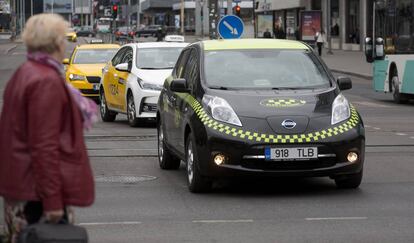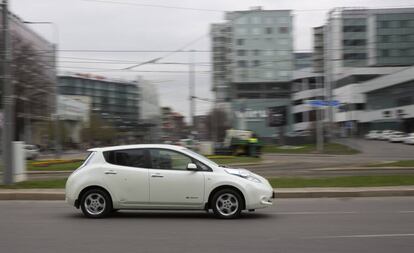The electric car revolution coming to your street
The change in attitudes is being driven by new technology

In the Boardrooms of the major carmakers a revolution is being planned. Companies are gearing up to replace our driven, analogue, mechanical cars with driverless, digital, electric ones. VW plans to sell 25% electric cars by 2025 and 50% by 2030. Volvo has targeted 20% and Mercedes 20-25% by 2025. As GM’s Mary Barra recently said, there will be more change in the car industry in the next 5 to 10 years than the last 50. But not all carmakers are investing: the boss of cash-strapped Fiat recently pleaded with customers not to buy their electric 500x model; Ford has been slow to join the race, as is Toyota that after betting on hydrogen has recently begun investing heavily in battery electric solutions. Automotive supply companies and the oil industry are also lobbying furiously to turn back the clock.
The change in attitudes is being driven by new technology and in the case of electrification astonishing cost reductions in batteries that over 15 years from 2010 will fall in price and improve in energy density by about a factor of 10. This will enable attractively priced 400km range models to complete with increasingly expensive engine cars. China, soon the overtake Europe as the world’s largest electric car market, is investing heavily creating a strong home market it intends will be a springboard for its companies to sell their models globally.
In Europe, the transition to electric cars is being given additional impetus by the Dieselgate scandal that shows no signs of abating. Just this week France has threatened to sue VW for €20 bn for manipulating its diesel car market. Daimler’s offices have been raided in Germany; and Fiat Chrysler being prosecuted in the US. Pressure is on to clean up Europe’s toxic air and cities including Paris, London Madrid, Athens and Stockholm plan to ban or charge dirty diesels. Government’s are pushing up diesel fuel taxes to discourage diesel cars sales. EU regulators are replacing obsolete tests and car approval processes that will require diesels to fit more effective, but more expensive, exhaust treatment systems. The diesel market share is slumping as a result down from a peak of 53% to around 47% whilst sales or electric and hybrid models increased by 37% in the last 12 months.
By the early 2020’s, over 4 years, an electric car is forecast to be cheaper to buy and run than a petrol model. However, a rapid take-up post 2020 assumes that forecast battery price reductions are not derailed by increases in the price of lithium and cobalt. For sales of electric cars to take off from their current niche (about 1% market share) buyers will also need to see recharging points along highways and in cities - even if most will only need to charge once or twice a week and this will be done predominately at home overnight or at work. There is also currently a chronic lack of choice in the market (about 20 electric models) and many of these are not available in all countries. Car taxation, especially for company cars, need to be reformed. Buyers will also need to be sold the vision and this requires significant investment in marketing electric cars that currently represents less than 1% of advertising budgets. The shift to electric cars will not come overnight – but it will happen quickly as it must if transport CO2 emissions are not to cause the Earth to dangerously warm and Europe miss its climate commitments made just a year ago in Paris.

Yoann Lepetit is Clean Vehicle and Emobility officer at Transport and Environment
Tu suscripción se está usando en otro dispositivo
¿Quieres añadir otro usuario a tu suscripción?
Si continúas leyendo en este dispositivo, no se podrá leer en el otro.
FlechaTu suscripción se está usando en otro dispositivo y solo puedes acceder a EL PAÍS desde un dispositivo a la vez.
Si quieres compartir tu cuenta, cambia tu suscripción a la modalidad Premium, así podrás añadir otro usuario. Cada uno accederá con su propia cuenta de email, lo que os permitirá personalizar vuestra experiencia en EL PAÍS.
¿Tienes una suscripción de empresa? Accede aquí para contratar más cuentas.
En el caso de no saber quién está usando tu cuenta, te recomendamos cambiar tu contraseña aquí.
Si decides continuar compartiendo tu cuenta, este mensaje se mostrará en tu dispositivo y en el de la otra persona que está usando tu cuenta de forma indefinida, afectando a tu experiencia de lectura. Puedes consultar aquí los términos y condiciones de la suscripción digital.
Archivado En
- Caso Volkswagen
- Emisión gases
- Estonia
- Parlamento europeo
- Coches eléctricos
- Contaminación atmosférica
- Fraudes
- Coches
- Volkswagen Group
- Vehículos
- Contaminación
- Fabricantes automóviles
- Unión Europea
- Problemas ambientales
- Automoción
- Organizaciones internacionales
- Europa
- Transporte
- Empresas
- Delitos
- Relaciones exteriores
- Economía
- Justicia
- Medio ambiente
- Industria
- Europa Ciudadana




























































